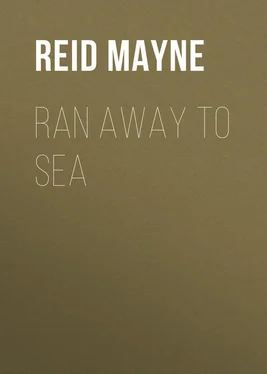Mayne Reid - Ran Away to Sea
Здесь есть возможность читать онлайн «Mayne Reid - Ran Away to Sea» — ознакомительный отрывок электронной книги совершенно бесплатно, а после прочтения отрывка купить полную версию. В некоторых случаях можно слушать аудио, скачать через торрент в формате fb2 и присутствует краткое содержание. Жанр: literature_19, foreign_antique, foreign_prose, foreign_children, на английском языке. Описание произведения, (предисловие) а так же отзывы посетителей доступны на портале библиотеки ЛибКат.
- Название:Ran Away to Sea
- Автор:
- Жанр:
- Год:неизвестен
- ISBN:нет данных
- Рейтинг книги:4 / 5. Голосов: 1
-
Избранное:Добавить в избранное
- Отзывы:
-
Ваша оценка:
- 80
- 1
- 2
- 3
- 4
- 5
Ran Away to Sea: краткое содержание, описание и аннотация
Предлагаем к чтению аннотацию, описание, краткое содержание или предисловие (зависит от того, что написал сам автор книги «Ran Away to Sea»). Если вы не нашли необходимую информацию о книге — напишите в комментариях, мы постараемся отыскать её.
Ran Away to Sea — читать онлайн ознакомительный отрывок
Ниже представлен текст книги, разбитый по страницам. Система сохранения места последней прочитанной страницы, позволяет с удобством читать онлайн бесплатно книгу «Ran Away to Sea», без необходимости каждый раз заново искать на чём Вы остановились. Поставьте закладку, и сможете в любой момент перейти на страницу, на которой закончили чтение.
Интервал:
Закладка:
The barque, on the other hand, had to haul down both royals and topgallant-sails, and close-reef her topsails. She was thus far from going at her fastest, but it blew so freshly it would have been dangerous for her to have spread another inch of canvas, and her people well knew it.
Under these circumstances the cutter was evidently gaining upon her; and if the breeze should continue at the same rate for two hours more the Pandora must certainly be overhauled and captured.
As soon as her crew became convinced of this, they set to work to hide all the implements of their nefarious trade. The manacles and shackles were put into a cask and headed up. The hatch-gratings, which the carpenter had been so long in making, were broken up and disfigured – so that their purpose could not be recognised – and the muskets, pistols, and cutlasses were stowed away in some secret part of the hold. There was no intention of making use of these, and showing fight against such an adversary. Small as was the cutter in comparison with the barque, the crew of the latter knew very well that that of the former would far outnumber them, and that any attempt at resistance to such a well-armed, sharp-toothed little ship of war would only bring her guns upon them, and end the conflict in the loss of at least half their number. They entertained no hope, therefore – except to escape by fast sailing – and as this was now well-nigh given up, they set to work to prepare themselves for passing an examination. Several of the crew actually hid themselves in order to avoid the suspicion which their numbers might create; for, as I had already observed, there were too many hands for a ship engaged in the ordinary way of commerce.
At a last measure the old skipper had got out his “ship’s papers,” which, of course, had been prepared for such an emergency, and which were to show that he was “all right.”
In this way the Pandora now awaited the nearer approach of her hostile pursuer.
The cutter had gained rapidly, and had at length got within less than a mile’s distance, when a gun was fired from her bow-ports that sent the shot ricochetting over the water, and close to the hull of the barque. A signal was also hoisted for the latter to “lay-to.”
My heart beat wildly within my breast. It seemed as if the hour of my deliverance had arrived; and yet I felt a contrary belief – a presentiment that it was not yet to be! Alas! that presentiment proved too true. With all the appearances in favour of our being captured it was not to be. The destiny of the Pandora was different.
Almost as if the firing of the gun had been a signal to the weather, and the wind suddenly began to lull, and at each moment grew lighter and lighter – till it was no longer a gale, but a soft and gentle breeze. The sun, that was now setting, no doubt had caused the change and in a few minutes’ time the sails became relaxed and fell flapping against the yards.
With a quick eye the change was observed by the crew of the Pandora , and the advantage understood. Instead, therefore, of yielding obedience to the signal from the cutter, all hands rushed quickly aloft – the topsails were unreefed to their fullest spread – topgallants and royals were unfurled, and even the studding-sails bent, till the whole rigging of the barque was covered with canvas.
The effect was almost immediately perceptible. Although the cutter now fired her guns as fast as she could load them, I could perceive that she was every moment losing ground, and her shots now fell short of the barque.
In another hour she was miles in our wake; and ere the darkness of night closed over the sea, and hid the little vessel altogether from my sight, I saw, with a sad heart, that she had dwindled to a mere speck upon the edge of the horizon!
Chapter Thirteen
The chase, which had lasted for nearly the whole of a day, carried the Pandora a hundred miles out of her course before she had fairly distanced the cutter; but she had to run still fifty miles further to make sure that the latter had lost sight of her, and, of course, abandoned the pursuit. The last part of the run, however, was made in a direction diagonal to that in which she had been chased; and as the morning broke, and there were no signs of the cutter nor any other sail, the slaver once more headed in for the coast. She was now so far to the south of the line on which she had encountered the cruiser, that, whether the latter kept on in the pursuit, or returned as she had come, in either case she would be too distant from the barque to make her out. The darkness of the night had also favoured the slaver’s escape, and, when morning came, her commander felt quite sure that the cutter was cruising far to the north of him, and beyond the range of the most powerful telescope.
The deviation which the Pandora had made from her course did not signify much to such a light sailer as she. She soon made up the loss; for next day the wind had veered round so as to answer for her course; and, as it blew but lightly, she was able to go under studding-sails, at the rate of ten and twelve knots an hour.
She was now heading directly for the African coast, and, before the sun had set, my eyes rested on the land – that land so long famous, or rather infamous, for its commerce in human beings – for the hunt, and the barter, and sale of men, women, and children!
During the night the barque stood off and on at several miles’ distance from the shore, and with the earliest light of morning ran close in.
There was no port nor town. Not even a house was in sight. The land was low, scarce rising above the sea-level, and appeared to be covered with a dense forest to the water’s edge. There was neither buoy nor beacon to direct the course of the vessel, but, for all that, the captain knew very well where he was steering to. It was not his first slaving expedition to the coast of Africa nor yet to the very port he was now heading for. He knew well where he was going; and, although the country appeared to be quite wild and uninhabited, he knew that there were people who expected him not far off.
One might have fancied that the Pandora was about to be run ashore, for, until she was within a few cables’ length of the beach, neither bay, nor landing-place presented itself to our view, and no orders had been given to drop anchor. It is true that most of her sails had been hauled down, and she was moving but slowly through the water, but still fast enough to strike with violence if permitted to approach much nearer.
Several of the crew, who were on their first voyage to this coast, began to express their surprise; but they were laughed at by the older hands who had been there before.
All at once the surprise was over. A little wooded point was rounded, and the line of the beach – which but the moment before had appeared continuous – was now seen to be broken by a long, narrow reach of water, that ran far back into the land. It proved to be the mouth of a small but deep river; and, without reconnoissance or hesitation, the barque entered across its bar, and, standing up stream, came to anchor about a mile inland from the sea.
Opposite to where we had anchored I could perceive a strangely-built hut standing near the bank, and another and larger one further back, and partially screened by the trees. In front of the former, and close to the water’s edge, was a group of dark-looking men, making some signals which were answered by the mate of the Pandora . Other men were down in a long canoe that was riding upon the water, and some were getting into it, as if about to be rowed out to us.
I saw the palms upon the bank – they were the first trees of this kind I had ever seen growing, but I easily recognised them by the pictures I had seen in books. There were other large trees, not less singular in their appearance, and differing altogether from the kinds I had been accustomed to look upon at home; but my attention was soon drawn from the trees by observing that the men in the canoe had parted from the shore and were paddling towards us.
Читать дальшеИнтервал:
Закладка:
Похожие книги на «Ran Away to Sea»
Представляем Вашему вниманию похожие книги на «Ran Away to Sea» списком для выбора. Мы отобрали схожую по названию и смыслу литературу в надежде предоставить читателям больше вариантов отыскать новые, интересные, ещё непрочитанные произведения.
Обсуждение, отзывы о книге «Ran Away to Sea» и просто собственные мнения читателей. Оставьте ваши комментарии, напишите, что Вы думаете о произведении, его смысле или главных героях. Укажите что конкретно понравилось, а что нет, и почему Вы так считаете.












